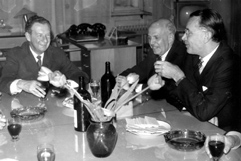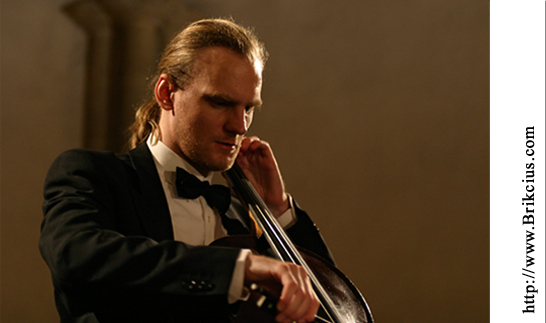Newsletter 16 (March - April 2011)
Invitation: "eSACHERe" Interview 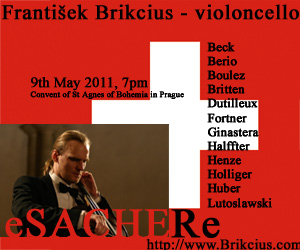 You are invited to
listen Klára Beránková's interview with cellist
František Brikcius talking about Swiss project "eSACHERe" on air on Radio
Proglas. Interview will be broadcasted on Friday 15th April 2011,
4.55pm, and on Wednesday 20th April 2011, 00.05am.
František Brikcius will be talking about the genesis of whole project as well about featured twelve composers and their compositions. As part of this interview you will hear, in radio premiere, excerpts from concert performance of ballet "MAKANNA" by Czech composer Irena Kosíková (Jan Talich - conductor, Jan Židlický - narrator, František Brikcius - cello & Talich Chamber Orchestra). Interview will be available to stream here. More info is on websites http://www.Brikcius.com and http://www.Proglas.cz . Interview eSACHERe
Friday 15th April 2011, 4.55pm,
and/or Wednesday 20th April 2011, 00.05am. Radio Proglas.
KLÁRA BERÁNKOVÁ - Redactor FRANTIŠEK BRIKCIUS - Cellist Competition: Win 5 x 2 honorary "eSACHERe" concert tickets
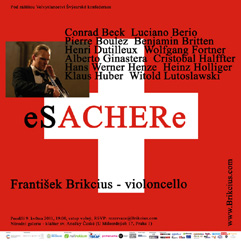 Partner of the Month: Britten-Pears Foundation  The Britten-Pears Foundation is
one of the most important musical charities in the UK and its work
extends throughout the world. Its principal functions are:
* Running a major grant-giving programme, supporting Aldeburgh Music; the composition of new music; the performance of Britten's music; and community projects in and around Aldeburgh; * Acting as an important centre for research, based on the most comprehensive single-composer archive in the world; * Curating Britten's home in Aldeburgh, The Red House, now seen as a heritage site of great significance; * Helping to promote Britten's music worldwide through a programme of publications, education and financial support. Working with his publishers, Britten-Pears Foundation has always been active in the international promotion of Britten's music, including the financial support of key performances and the publication of catalogues, books and recordings. Two key projects that Britten-Pears Foundation will conclude by the time of the Centenary are the publication of Britten's Letters in six volumes and the first online Thematic Catalogue of a composer's work in the world. Britten-Pears Foundation's unique archive contains 98% of Britten's manuscripts as well as 80,000 letters, artworks and artefacts relating to his life and music. What is special about this archive is that it is housed in the place where Britten worked and lived. Meet ... Composer and Conductor Benjamin Britten 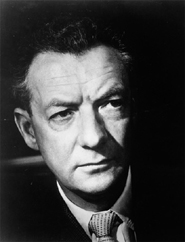 Edward Benjamin Britten, Lord Britten of Aldeburgh (*22. 11. 1913 - †4.12. 1976) English composer,
conductor and pianist Edward Benjamin Britten, Baron Britten of
Aldeburgh [Lord Britten of Aldeburgh], was born in Lowestoft, Suffolk
on 22 November 1913. He was the youngest of four children of Robert, a
dentist and talented amateur musician and his wife Edith, a singer and
pianist. He started to learn the piano and began to compose from the
age of five; at ten he began viola lessons. In 1928 it was arranged for
him to have lessons with the composer Frank Bridge.
In 1930 Britten entered the Royal College of Music in London (he won a scholarship to the RCM), sharing a flat with his sister Beth and studying composition with John Ireland and piano with Arthur Benjamin. At the end of his second year at the RCM, Britten won the Cobbett Chamber Music Prize. In December 1932 Britten graduated and was awarded a Ł100 travel grant. Britten had also intended to study with Alban Berg in Vienna. In 1934 Britten's Phantasy Quartet was selected for performance at the International Society for Contemporary Music (ISCM) Festival in Florence and his choral variations, A Boy was Born, written for the BBC Singers, were broadcast by the BBC. Britten's father died in April 1934. In October 1934 Britten and his mother travelled to Vienna. There he met the music editor Erwin Stein, who later came to England as a refugee and took a position in the music publishing house Boosey and Hawkes, where the director Ralph Hawkes had already signed Britten up as a composer. In 1935 he wrote a collection of Songs of Friday Afternoons, written for Friday afternoon music at the Clive House School, Prestatyn where Britten's brother, Robert, was headmaster. In April 1935 Britten started writing the film scores for series of documentary films showing aspects of English life (the King's Stamp, Coal Face, Night Mail, …) produced by the General Post Office Film Unit. Here Britten collaborated with the poet W. H. Auden, who supplied the narrative for some of the films accompanied by Britten's music. In 1936 Britten attended the ISCM festival in Barcelona. Later the same year, when he was commissioned to write a work for the Norwich Festival, he used a text by Auden for the song cycle Our Hunting Fathers, about human's relation to animals, both attacking the fox-hunting set at home and acting as a parable for the emergence of Nazism abroad. He composed the music for the feature film Love from a Stranger, based on a short story by Agatha Christie and starring Ann Harding and Basil Rathbone. In January 1937 Britten's mother Edith Britten died of a heart attack. 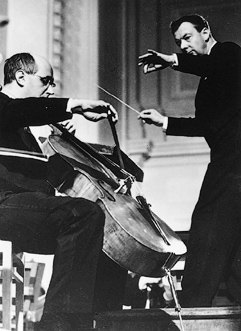 In 1937, he first met the tenor Peter Pears, with whom he entered into the lifelong personal and creative partnership that was to become a major inspiration for his music. He composed a Pacifist March with words by Ronald Duncan, for the Peace Pledge Union, of which, as a pacifist, he had become an active member. In 1939 he wrote an orchestral cantata, Ballad of Heroes, to words by Swingler and Auden in commemoration of the British members of the International Brigade, who fell fighting the fascists in Spain. Five months before the outbreak of World War Two, Britten and Pears sailed to North America and stayed there for three years. In September 1939 they wanted to return to England, but were told they would be more valuable if they stayed in the States and increased sympathy for Britain there. In the States Britten met Aaron Copland and composed the Sinfonia da Requiem (1940) in memory of his parents and commissioned to celebrate the 2600th Anniversary of the Founding of the Japanese Empire. It was, however, not performed at the Japanese celebrations. At last, in March 1942 the longed-for visas were obtained and Britten and Pears returned to England on the Swedish cargo ship Axel Johnson. During the voyage the ship's funnel caught fire and the rest of the convoy had to leave the ship to the mercy of an Atlantic dominated by Nazi submarines. Although exempt from military service, Britten and Pears were under obligation to support the war effort through the use of their musical abilities. This meant recital tours for the Council for the Encouragement of Music and the Arts (CEMA) to many remote and sometimes dangerous places in addition to Britten's composing activities and Pears's involvement as a singer with the Sadler's Wells opera company. Later Britten and Yehudi Menuhin played for Holocaust survivors during a ten-day tour of Germany in July 1945. The importance of Britten and Pears in post-War British cultural life was enhanced by their involvement in the founding of the English Opera Group in 1946 and the Aldeburgh Festival of Music and the Arts in June 1948. One of Britten's best-known works is The Young Person's Guide to the Orchestra (1946), which was composed to accompany the educational film Instruments of the Orchestra produced by the British government. Britten and Pears's recital at the Leeds Festival (1953). Friendship with English actor, director and producer David Hemmings. In 1955 Britten and Pears, with their friends the Prince and Princess of Hesse and the Rhine, toured the East, including a visit to the island of Bali. The greatest success of Britten's career was the War Requiem, written for the 1962 consecration of the newly reconstructed Coventry Cathedral after its almost complete destruction during World War II. Britten developed close friendships with Russian musicians Dmitri Shostakovich, Mstislav Rostropovich and his wife Galina Vishnevskaya in the 1960s. This led to the Cello Sonata (1961), the Cello Symphony (1963), and three Cello suites for cello solo (1964, 1967, and 1971). The 1970 Aldeburgh Festival was marked by the attendance of the Queen. By 1973 Britten's health had deteriorated considerably. Work became increasingly difficult during 1976 and it was in this year that Britten wrote one of his last compositions, the Tema 'Sacher' that Rostropovich would play for the 70th birthday of Paul Sacher. Benjamin Britten received many awards and honours including the Companion of Honour in the Coronation Honours (1953), the Order of Merit (1965), UNESCO's International Rostrum of Composers 1961, Grammy Awards - Classical Album of the Year (1963), Grammy Awards - Best Classical Performance (1963), Grammy Awards - Best Classical Composition by a Contemporary Composer (1963), Sonning Award in Denmark (1967), BRIT Awards - Best Orchestral Album (1977) and Grammy Hall of Fame Award (1998). In 1976, six months before his death, he was created Life Peer "Baron Britten of Aldeburgh in the County of Suffolk", the first composer ever to receive that honour from the Queen. He died in the arms of Peter Pears on 4 December 1976 in Aldeburgh. Together with another 11 composers - friends (C. Beck, L. Berio, P. Boulez, B. Britten, H. Dutilleux, W. Fortner, A. Ginastera, C. Halffter, H. W. Henze, H. Holliger, K. Huber and W. Lutoslawski) of Swiss composer and maecenas Paul Sacher (1906 - 1999), he was asked by Russian cellist Mstislav Rostropovich on the occasion of Sacher's 70th birthday to write composition for cello solo with use of notes creating his name (eS, A, C, H, E, Re). Benjamin Britten created Tema 'Sacher'. Compositions were partially presented in Zurich on 2nd May 1976. Whole "eSACHERe" project will be (for the first time in complete performance) performed by Czech Cellist František Brikcius in 2011 in Prague. For more about Benjamin
Britten visit http://www.Brikcius.com , http://www.BrittenPears.org
and http://En.Wikipedia.org/Wiki/Britten,_Benjamin,_Baron
.
Call for ... support project "eSACHERe" 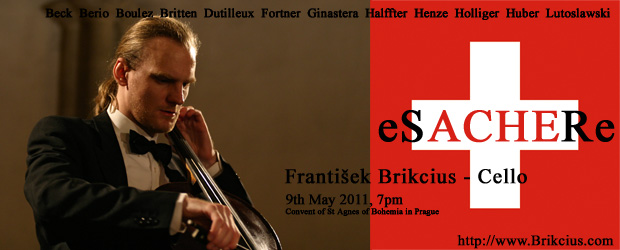 Would you like to support
Swiss project "eSACHERe"?
- Contact us. - Send any financial support to mentioned bank account number, PayPal. - Publish "eSACHERe" banner (various sizes at section DOWNLOAD), poster & link http://www.Brikcius.com on your websites and/or on your FaceBook, MySpace and other social networks. |
